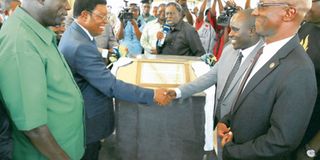Government plans regional mineral trading centres

What you need to know:
- Tanzania is expected to establish more international minerals markets, to boost the sector contribution to the national economy as well as those of individual involved in mining.
Geita/Dar es Salaam. The government has directed all regional commissioners to establish mineral trading centres in their regions to boost the sector’s contribution to individual incomes and the national economy.
Prime Minister Kassim Majaliwa issued the directive yesterday in Geita during the official launch of the Geita gold trading centre, which will accommodate buyers, miners, government offices, banks and dealers at a one-stop centre. Geita is one of the major gold producing regions, and accounts for more than half of all gold produced in Tanzania.
“The government is striving to make sure that minerals benefit the people, elevate the incomes of small-scale miners as well as boost government revenue from the sector,” Mr Majaliwa said. He directed the Ministry of Minerals, local government authorities and the Minerals Commission to make sure that the centres are established since it was the main challenge facing small-scale miners.
“The government has formulated rules on mining sector supervision, and I call upon the ministry and the commission to revisit regulations on the establishment of mineral trading centres in each region,” he said.
The Prime Minister said the government has offered incentives to small-scale miners including abolishing 18 per cent VAT and five per cent withholding tax to curb illegal mineral trade, which denies the government and miners income.
“We felt that these two taxes discouraged miners from selling their gold in the local market and they opted to sell them in the black market, where they fetched low prices,” he said.
Mr Majaliwa added that the establishment of mineral trading centres would not only end the challenges facing miners, but also enable the government to coordinate tax collection.
In 2017, the government also enabled the sovereign wealth laws, which recognizes minerals as rare resources that have beneficial to not only miners, but also traders, the government and surrounding communities.
The PM has also directed the ministry of minerals, the mining commission to make sure that the minerals indicative price is considered during buying and selling the product at the market.
He called for an increased public education on how the markets are working to encourage more people to use the infrastructure, but warning government officials to remain accountable and trustful.
The Tanzania Bankers Association chairman and CRDB Bank managing director, Mr Abdulmajid Nsekela, acknowledged the measures that had so far been taken by President John Magufuli’s administration in improving the mineral sector.
He said recent laws, approved by the Parliament and signed by the President, was true testimony to the steps that the government was taking to improve the sector.
“Today is a historic day to our nation. It is my hope that this hub will be turned into a one stop centre in as far as he buying and selling of minerals in Tanzania is concerned,” he said.
The Chairman of Federation of Miners Association of Tanzania (Femata) John Bina called for banks to extend loans to the sector, mainly small scale miners.




